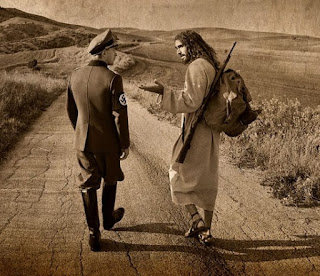It also reminds me of how the Bible addresses being offended as well as offending. James leads into an example with:
For in many things we offend all. If any man offend not in word, the same is a perfect man, and able also to bridle the whole body. (James 3:2 KJV)
The following verses address how we work to bridle our tongue to keep from being offensive, and how easy it is to fail:
Even so the tongue is a little member, and boasteth great things. Behold, how great a matter a little fire kindleth! And the tongue is a fire, a world of iniquity: so is the tongue among our members, that it defileth the whole body, and setteth on fire the course of nature; and it is set on fire of hell. (James 3:5-6 KJV)
John 16:22-59, where Jesus speaks of being the Bread of Life, caused murmurings among His followers. His response to them was a question:
When Jesus knew in himself that his disciples murmured at it, he said unto them, Doth this offend you? (John 6:61 KJV)
It became very obvious that some were offended. From our perspective, I wonder what they found offense in His words, and in His response for them to:
From that time many of his disciples went back, and walked no more with him. Then said Jesus unto the twelve, Will ye also go away? (John 6:66-67 KJV)
Eleven of the twelve did not leave. We know what the one did. Was it all for money? If so, that wasn’t much, even for that time. Certainly isn’t sufficient to betray a friend. But apparently Judas was offended that Jesus was NOT what he expected. Obviously, the religious leaders were offended because Jesus told them they were not what God expected. Yet chapter 16 begins with Jesus’ goal:
These things have I spoken unto you, that ye should not be offended. (John 16:1 KJV)
During Jesus’ preparation for betrayal, the disciples were told that they would be offended because of Him. Peter’s answer was included twice in the gospels:
Peter answered and said unto him, Though all men shall be offended because of thee, yet will I never be offended. (Matthew 26:33 KJV)
But Peter said unto him, Although all shall be offended, yet will not I. (Mark 14:29 KJV)
Peter’s failure is also included. And ours is somewhere, too, isn’t it? Hopefully not in the hearts of people we have offended. Which means we need to bridle our tongues – though we’ve just read how hard that is! Is it true impossible? As James wrote, must we be perfect?
As usual, the Bible has the answer – and this may not be the one you remember. There are two others:
And he said, The things which are impossible with men are possible with God. (Luke 18:27 KJV)
Remember, the New Testament is based on what exists in the Old. There we find the “How to not be offended”:
Great peace have they which love thy law: and nothing shall offend them. (Psalms 119:165 KJV)
Thanks be to God that this verse does not say: " . . . they which keep thy law . . ." It is easy to love God’s laws once we study them and realize their base:
Jesus said unto him, Thou shalt love the Lord thy God with all thy heart, and with all thy soul, and with all thy mind. This is the first and great commandment. And the second is like unto it, Thou shalt love thy neighbour as thyself. On these two commandments hang all the law and the prophets. (Matthew 22:37-40 KJV)
Look over the Ten Commandments in Exodus 20:2-17, or take time to read all of the laws in the Pentateuch. Did you find one not based on loving God or our fellowman? Isn’t that all that is required when we walk humbly with our Lord, as written in Micah 6:8?









